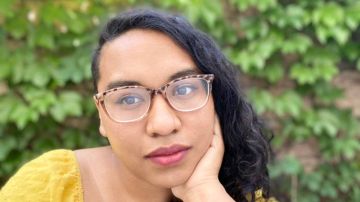The First Gen Struggles of Not Feeling Latina Enough
I’m too “gringa” to be fully Latina because I’m not yet fluent in Spanish

Photo courtesy of Damaris Galeano
Being the daughter of immigrants from El Salvador and Honduras, I am constantly straddling two identities. I’m Latina in one and American in the other. But I never seem to be enough on either side. I’m too “gringa” to be fully Latina because I’m not yet fluent in Spanish and don’t know Latin dances. I’m too Latina to be American because my obvious physical Latina characteristics “betray” me. It’s a struggle many are all too familiar with. Where do we belong? What does it mean to be Latina?
Although the rest of my siblings were all born in Los Angeles, I was born in Waconia, a very small town in Minnesota that, at the time, had fewer than 7,000 people living in it and where the majority were white. I spent my toddler years there, and because no one outside my family spoke Spanish, I never really learned. We then moved back to Los Angeles, a predominantly Latinx area, and yet I still didn’t learn to speak Spanish. I could understand it perfectly, but I only knew a few words and phrases.
One story my family loved to tell was when I was about three or four years old, and my mother took me to Santa Ana, her hometown in El Salvador. There I would try to play with the kids, but although I could understand them, they couldn’t understand me. They would go to my mother and ask why I didn’t speak Spanish. I may have looked like them, but I wasn’t one of them.
Growing up, I tried at times to speak Spanish around my family, but the slightest mistake meant ridicule for however long my family thought it was funny. I would also almost never actually hear them tell me the correct way to say things. So at some point, I stopped trying.
The older I got, the more I separated myself from my roots. I don’t think it was a conscious decision, it just happened that way. I only spoke English, never learned Latin dances and barely cooked Salvadoran food. Family members would call me gringa or even “coconut”- brown on the outside, white on the inside. Instead of signing up for Spanish classes in school, I signed up for Italian and French classes. I figured going into a Spanish class as a Latina kid would just result in more embarrassment for me since I thought I would be made fun of if I couldn’t roll my R’s or say things right.
Although my Spanish improved slightly over time as I became less shy practicing in front of my family, it became a more mangled Spanglish. I couldn’t speak a complete Spanish sentence to save my life, and again my family picked up on it. School was a bit more of a safe space as most of my friends understood my experience since many of them were first-gen kids as well. I do, however, remember a friend I had that would make fun of how I would say chipotle since I would always use the Spanish pronunciation. He, along with many others, would pronounce it with the Americanized pronunciation of chee:POHT:lay. Another way I wasn’t “American enough”.
Things began to change in college a couple of years ago. I learned more about the way society has been constructed to keep people like me down in my history classes, as well as through independent reading and research. Instead of shame, I began to feel angry. Angry that I felt forced to deny this part of me. Angry at myself for actually doing it. I began to embrace being a Latina. I began trying to learn to speak Spanish more fluently by asking my mother to help me, listening to Latin music, and watching movies I knew in Spanish. At that point, although my Spanish had improved, I was far from fluent. I began looking into my culture and then wondering why I denied such a beautiful part of me.
I asked my mother for more and more stories about her home and my relatives, and our history. However, when she passed away in 2019, it made me realize how much she was my link to my culture. My father was never really in the picture, so I identify as being more Salvadoran, so when she passed I felt disconnected yet again without her stories. I began asking myself what it meant for me to be a Latina born in America. I realized it really was different for everyone. I realized that, in some ways, I would never “be enough” for societal standards. So I decided that I was enough. I was American enough, and I was Latina enough.
I still connect to my culture by speaking Spanish but I recognize that my language skills don’t make me more or less who I am. I like “American” things like Starbucks and pumpkin spiced lattes, but I also like cafe de olla with a Salvadoran breakfast. I am not one thing, and I was never supposed to be.
I am still trying to connect more to my Latina side since it makes me feel closer to my mother, but it helps to have the pressure of “being enough” off my shoulders. Some ways I feel connected to my culture are by supporting Latinx-owned businesses like Cadena Collective and Hija De Tu Madre, learning more about my culture’s roots and history through books and stories, talking to my family about El Salvador, and understanding that just as I have my own way of defining what it means to be Latina, others also have their own ways, and it’s all valid.

















